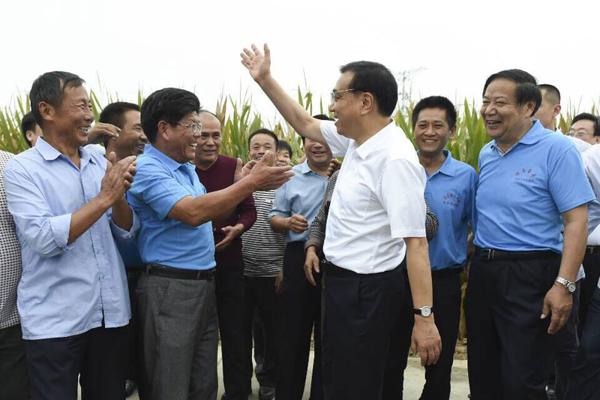
Premier Li Keqiang makes an inspection trip to a farmland in Changge county, Henan province on Sept 24, 2015.[Photo/www.gov.cn]
Large-scale operations of agriculture in various forms should be promoted while fully respecting farmers’ wishes, Premier Li Keqiang said at a State Council executive meeting in July, when farmland protection and law-abiding land contracts were urged.
“Most of us either have been farmers, or have fed on what farmers produce. We should work for the farmers with full empathy,” the Premier said.
Land can only fully produce on scale effect
Exploring large-scale operations has always been one important direction for agricultural reform and modernization.
During the executive meeting in July, Premier Li recalled an inspection trip to Southwest China’s Yunnan and Guizhou provinces.
“It is sad to see field ridges that take up nearly 20 percent of those tiny land pieces,” he said. “If shareholding cooperation can be promoted among farmers, we can eliminate the ridges and have large machinery perform deep plowing to prevent the overuse of fertilizer.”
In fact, the development of modern agriculture has always been one of the major priorities of discussion at the executive meetings during the past two years.
An executive meeting in April 2013 mapped out plans for the comprehensive reform of modern agriculture. In December 2014, it decided to enhance taxation support for the rural financial sector and another meeting in March called for accelerated and sustainable development of modern agriculture.
Develop agriculture with industrial concepts
Some 10 years ago, during an inspection trip to Canada, Premier Li noticed that people there referred to agriculture as “agriculture industry”, which perplexed him.
Later he understood the phrase because industrial methods were adopted to connect the different links in food production, from seed selection, cultivation and harvest to processing and marketing food, so that the products could be sold to all over the world.
“The agricultural restructuring should depend on the market and consumers’ need, so that farmers’ income can be further improved,” Premier Li said at the executive meeting in July, which encouraged the development of crop production, agricultural processing and services to extend the value chain.
The Premier also called for effective solutions to tackle major problems, such as how to elevate product price and subsidies.
Narrow urban-rural gaps to enable free flow of farmers
In Premier Li’s philosophy of agriculture development, the process of urbanization should parallel agricultural modernization in a bid to enrich the farmers. The vast number of rural migrant workers has always been a major concern for the Premier.
According to the 2014 government work report, by 2020, around 100 million rural migrant workers are expected to obtain urban citizenship; shantytown transformation projects will benefit around 100 million people and the urbanization in Central and Western China will also cover 100 million people.
Premier Li urged cities to integrate rural migrant workers who live and work there as new citizens so that they can enjoy equal public services.
A State Council executive meeting in June also discussed policies that support farmers to return to hometowns and start new businesses.
“We should focus on narrowing the gap between urban and rural areas to facilitate free flow and equal opportunities for farmers,” said the Premier.
